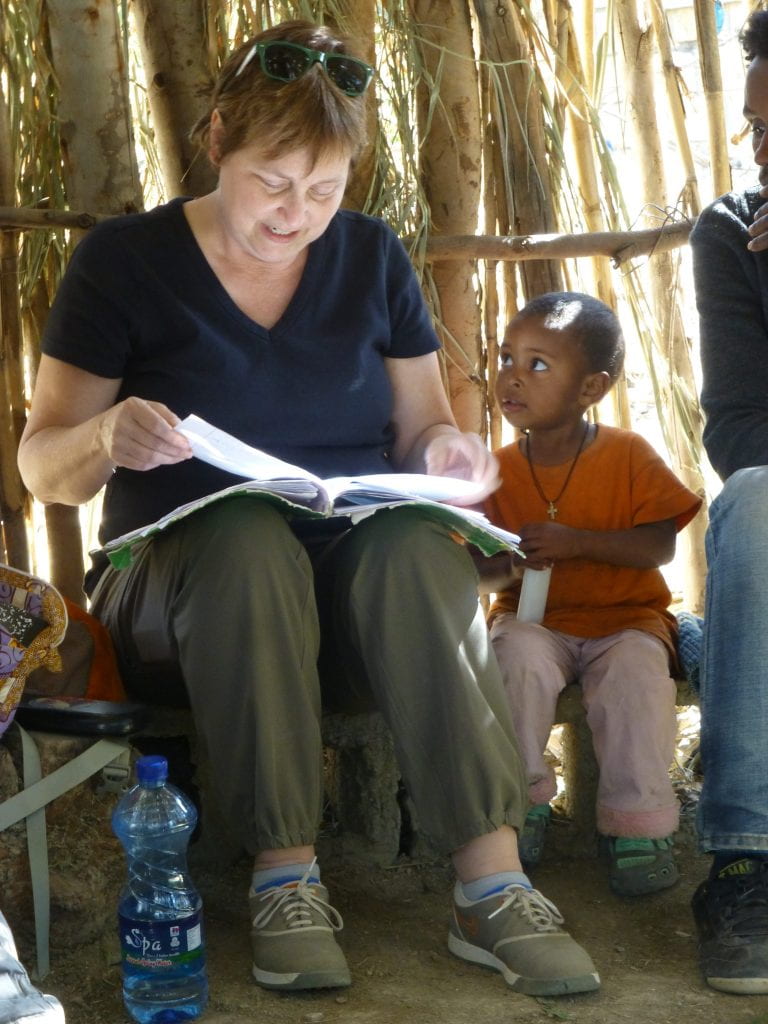While many college students headed home for the holidays, a group of six students and two mentors from Washington University in St. Louis instead boarded a plane bound for Ethiopia.
The students, all members of the Engineers Without Borders Washington University (EWB-WU) student chapter, traveled to continue a partnership that began back in 2011. The partner, Mekelle School for the Blind, sits on the edge of a bustling metropolis that struggles with infrastructure challenges that plague many developing cities.

In the past, the team has focused on challenges ranging from water storage to electricity. For this trip, students turned their attention to an environmental challenge. The climate of Mekelle consists of a ten-month dry season, where the landscape is comparable to the desert southwest of the United State, and a two-month rainy season that turns dry stream beds into raging rivers. During the rainy season, the only bridge connecting the student dormitories to the school buildings floods with anywhere from six to 24 inches of contaminated storm water.
Leading the team was Robin Shepard, PhD, an adjunct professor in the School of Engineering and Applied Science, and Kimberly Weaver, the engineering educator at the Institute for School Partnership. Under their guidance, the students conducted interviews with school leaders to assess needs, installed a stream gauge to collect data and developed short-term solutions for their local partners to help with drainage around the bridge.
“I was very impressed with the Washington University students,” Weaver said. “They were so intelligent, eager to learn and very focused on doing an exceptional job for their host community.”
The trip had a unique meaning and impact for each student that went. For Gregg Wilcox, a sophomore double majoring in Systems Engineering and Physics, the trip hit close to home.
“As my family is South African, I understood to a degree the problems facing Africa,” Wilcox said.
“Participating in Engineers Without Borders had long been a dream of mine because it allowed me to help people and see the practical applications of the field I wanted to study.”
For other students, like Ryan Blumenstein, a senior majoring in Mechanical Engineering, this trip was not his first visit to Mekelle.
“I’ve been traveling to Mekelle with the project since 2012, and I was very excited to go back,” Blumenstein said. “I think our meetings with the principal and the Education Bureau had the most impact on me, as they allowed me to understand just how far our group has helped the school come in the past four years.”

Blumenstein said that what matters most to him are the tangible differences the work makes in the lives of the nearly 100 blind students living at the school.
As one of only six blind schools in Ethiopia, children are brought to Mekelle from around the region to live and receive an education at no cost to the family. While many students remain connected to their families, some are abandoned at the school because of their disability.
One EWB-WU team member, David Sehloff, a junior double majoring in Electrical and Systems Engineering, shared his experience with one Ethiopian student, a fifth grader at the school in Mekelle.
“I know that he is capable of great achievements if he is given the right opportunities,” Sehloff said. “The Mekelle School for the Blind has been one of the first of these opportunities, a foundation of learning, for him and many other children, and that is why it is important to me to do whatever possible to support the school community.”
Over the next year, the EWB-WU team will collect and assess the data collected by their partners in Ethiopia. Ideally, the team will return in January 2016 to implement solutions based on the data collected so that these students can cross safely to and from their classes.
Nationally, EWB is motivated by the vision of a world in which the communities served by the various chapters have the capacity to sustainably meet basic human needs, a vision that the university students learned first hand on this trip.
“In addition to helping the school, I felt that it was an equally important task to mentor the Washington University students,” Weaver said. “The trip really taught that engineering is not only about money or a stable career but about making real changes in someone’s life.”
January 2015 | by, Gennafer Barajas
